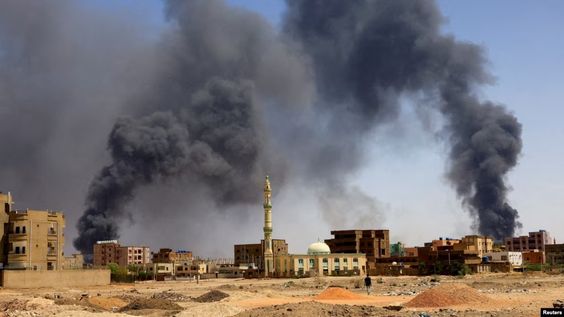Africa
Shelling and theft occur in Sudan’s capital as military factions engage in an eight-week war

Residents reported shelling and violent clashes in the capital Khartoum and the western region of Darfur on Monday, following more than seven weeks of fighting between opposing military factions.
Following the expiration of a cease-fire agreement brokered by Saudi Arabia and the United States late Saturday, fighting between the army and the paramilitary Rapid Support Forces (RSF) grew worse.
More than 1.2 million people have been displaced by the war within Sudan, and about 400,000 have fled into neighboring nations. The war has severely damaged the capital, leaving the remaining citizens vulnerable to battles, airstrikes, and looting.
Residents in Khartoum, Omdurman, and Bahri, the three cities that make up the country’s larger capital, said they saw smoke rising in some areas on Monday as a result of fierce fighting. They reported fighting in Omdurman and clashes in southern Khartoum.
According to Mohamed Saleh, a resident of Omdurman, age 37, “the neighborhood where we live is looted publicly on a daily basis without anyone intervening to prevent it, with clashes and shelling continuing around us.”
According to local resident Waleed Adam, RSF troops in the capital’s Khartoum East district were in complete control and engaged in widespread looting.
“You see them right in front of you, taking cars, money, gold – whatever they can get their hands on,” he said by phone to Reuters. I suppose it’s only a matter of time before they pass through my street.
The RSF claims that by apprehending looters, it has been attempting to protect civilians.
Darfur conflict
Some refugees from the conflict have traveled to nearby nations like Chad, South Sudan, and Central African Republic (CAR), which are already dealing with poverty, conflict, and a reduction in humanitarian aid.
The U.N. humanitarian coordinator for CAR, Mohamed Ag Ayoya, stated at a news briefing in Geneva that the arrival of nearly 14,000 people in northeastern CAR and the suspension of cross-border trade “puts additional pressure on the limited resources available to the 130,000 extremely vulnerable people in the region.”
Unrest has also been brought on by the war in Darfur, in the far western region of Sudan, where people have reported attacks by militias connected to Arab nomadic tribes and where there was already widespread displacement as a result of previous conflict.
According to activists who watch the area, at least 40 people have died and dozens more have been injured recently in Kutum in North Darfur State. Additionally, locals have complained of a lot of looting and insecurity.
In a video released on Monday, the RSF, which has its power base in Darfur and its origins in the Arab-dominated militias, claimed to have taken control of the army’s headquarters in Kutum, a bustling commercial center and one of the state’s larger towns.
The army, which on Sunday denied that the RSF had taken the town, did not immediately respond to a request for comment.
Parts of Darfur have experienced protracted communication blackouts, making it particularly difficult for aid organizations to import humanitarian supplies.
Residents in El Obeid, a city 360 kilometers (220 miles) southwest of Khartoum and on a crucial route from the capital to Darfur, reported seeing numerous RSF troops deployed and some roads closed.
The first rains of the year have begun to fall in Khartoum in recent days, signaling the beginning of the rainy season, which will likely complicate an already difficult relief effort due to logistical issues and bureaucratic delays.
